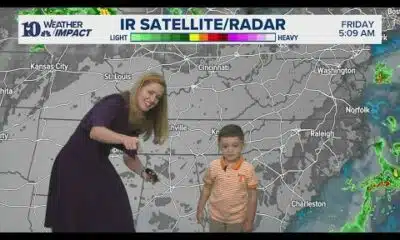News from the South - West Virginia News Feed
Morrisey signs session’s key foster care bill, vetoes other measure meant to help system in crisis
The West Virginia State Capitol (West Virginia Legislative Photography)
Gov. Patrick Morrisey has signed lawmakers’ key foster care measure into law – an omnibus bill that folded together several pieces of legislation. It includes creating a team to review the death of a foster child that occurred while in state care.
The Republican governor opted to veto other child welfare-related items, including a bill that would have provided pay raises for attorneys representing foster children. He also slashed lawmakers’ funding for a nonprofit that helps foster kids.
Lawmakers came into the 60-day session saying they must address widespread issues in the state’s troubled foster care system that is serving more than 6,000 children with a shortage of social workers, support services and safe homes for children. Too many children have ended up living in hotel rooms, and the state spent $70 million last year sending foster kids to out-of-state group homes. And, for years, the state hasn’t wanted to answer questions about what’s happening to kids in the child welfare system.
While many of the proposed bills – including one mandating an outside review of the foster system – never made it up for a vote by deadline, lawmakers behind the successful foster care measure say it’s a step in the right direction.
Foster care is a “glaring area of need in state government,” said Del. Jonathan Pinson, R-Mason, who is a foster parent.

“We made it clear that we are willing and committed to taking action … We’ve tried over the course of several years to identify areas that need attention and need work, and many of those areas got touched by [House Bill] 2880,” he continued. “There’s always work to be done, but when you look at the measure that we did get passed … I’m pleased with where we’re at.”
Senate Minority Leader Mike Woelfel, D-Cabell, called it the “most important bill of the session.”

“For all the praying we do in the Senate, these are the least among us. These are the most vulnerable people,” he said. “There was a lot of bipartisan work that went into this … It’s a really thoughtful bill. It’s going to help kids.”
But, more should have been done, he emphasized.
“This bill would hit like 20% of what we could have done during the session,” he said. “This is just a screaming issue for the little ones who have no lobbyists.”
During the Legislative Session, a federal judge dismissed a sweeping lawsuit brought by foster children against the state for alleged mistreatment in care. The judge said that the ongoing problems couldn’t be solved by the courts, and the “blame squarely lies with the West Virginia state government.”
What’s included in the bill
The foster care measure nearly died in the final hours of session last month as Senate and House members struggled to come to an agreement on what it should contain.
Woelfel told lawmakers in a conference committee hashing out the bill that they couldn’t let the session’s only foster care measure die. Lawmakers eventually agreed to remove a part of the bill that would have regulated in-state behavioral programs for children, and said they’d work on that part in a separate bill for next year.
House Bill 2880 in its final form folds together several different foster care measures from this session, including mandating that parent resource navigators, who help parents who are seeking to reunify with their children, be included in key meetings about the child’s case. Parent resource navigators are established through the court system.
West Virginia terminates parental rights at twice the rate of any other state.
“It’s always about reunification with biological mom and dad, but they don’t always get a lot of resources through navigating the complex system,” explained Del. Adam Burkhammer, R-Lewis, who sponsored the bill. Burkhammer is a foster parent.

The measure also created a Critical Incident Review Team that will review a fatality or near fatality of a child in the custody of the state Department of Human Services. The team must meet within 45 days of the fatality or near fatality to conduct the review and share a report with lawmakers and online.
“I think probably the best part of the bill is the Critical Incident Review Team and being able to put an additional set of eyes on these fatalities and near fatalities,” Pinson said, adding the goal is to help prevent future incidents. “Being able to bring in additional resources to address our response to these very serious situations is demanded.”
The bill also included some new requirements for the state’s online Child Welfare Dashboard, including additional information about the state’s Child Protective Service workforce.
Angelica Hightower, communications specialist for the Department of Human Services, said that the agency didn’t have any concerns with the bill.
“We recognize the intent of this legislation to strengthen the delivery and oversight of services within our child welfare system and broader human services framework,” she wrote in an email. “As we move toward implementation, the department is committed to working collaboratively to ensure that the measures outlined in the bill are carried out effectively and in alignment with the needs of West Virginia’s children and families.”
Lawmakers also revised childhood immunization rules for foster families in a bundle of rules changes, Burkhammer said. Foster parents will no longer be required to provide the vaccination records of their biological children as an eligibility condition to open their home to a foster child.
Both Burkhammer and Pinson said lawmakers’ failure to fix ongoing issues with the state’s voucher system, which provides money for their foster kids’ clothes and other items, was the biggest failure in foster care reform this session.
The current voucher system limits spending to only certain stores and regularly results in foster parents and kinship caregivers spending their own money to pay for clothes, beds, car seats and more.
“When parents are willing to step up and put themselves out there for foster children, we’ve got to make sure that as a state we can provide the resources that they need,” Pinson said.
Morrisey vetoes pay raise for guardian ad litems amid shortage
Morrisey vetoed House Bill 2351, sponsored by Burkhammer, which would have given public defenders and guardian ad litems a pay raise of an additional $10 per hour for in- and out-of-court work.
The state has a shortage of guardian ad litems, which are required in child welfare cases and represent the best interests of the child. The shortfall has led to cases often lingering in the court system while children await permanency.
In his veto message, Morrisey said he was “sympathetic to the intent of this bill” but noted that lawmakers had reduced his proposed funding amount for the Public Defender Services.
“I want West Virginia to be a national model for fiscal responsibility, and this bill fails to meet that objective,” Morrisey wrote. “The math does not add up. The Legislature did not fully fund this line item for the ensuing fiscal year, which necessitates the veto of this bill.”
Burkhammer emphasized that the shortage of guardian ad litems has led to “low quality of services.”
“Ulimateily, the child’s best interest is not getting the attention it deserves,” he said.
Morrisey also cut 75% of lawmakers’ allocated funding to West Virginia’s Court Appointed Special Advocates, or CASA, a program that helps foster children in the court system, before signing the budget bill.
In his veto message, the governor said the program relies on grants and could seek additional grant funding.
Woelfel believes that despite the vetoes, Morrisey is committed to foster care reform.
“I’m taking him at his word,” he said. “I think it has got to be a team effort.”
The post Morrisey signs session’s key foster care bill, vetoes other measure meant to help system in crisis appeared first on westvirginiawatch.com
Note: The following A.I. based commentary is not part of the original article, reproduced above, but is offered in the hopes that it will promote greater media literacy and critical thinking, by making any potential bias more visible to the reader –Staff Editor.
Political Bias Rating: Centrist
The content presents a balanced view on foster care reform in West Virginia, highlighting actions and positions from both Republican and Democratic lawmakers as well as the Republican governor. It reports on legislative efforts, vetoes, and critiques from multiple perspectives without strongly favoring one political ideology over another. The article emphasizes bipartisan cooperation and acknowledges shortcomings on all sides, indicating a centrist tone in its coverage.
News from the South - West Virginia News Feed
Despite research, WV counties refuse to fund harm reduction with opioid funds
by Ty McClung, West Virginia University, West Virginia Watch
July 10, 2025
On a warm summer day in late May, about 100 people are waiting for their turn to go inside the Neighborhood S.H.O.P., located in the annex of Bream Memorial Presbyterian Church on the West Side of Charleston, West Virginia.
Inside the S.H.O.P. — which stands for Showers Healthcare Outreach Program — they will find resources like naloxone, clothing, first-aid supplies, food, showers and people offering services from rental to legal assistance. Director Derek Hudson says the no-barrier organization aids almost 2,000 people a month.
“The whole goal is to have people come in, be heard and know that at least someone is trying to help them,” Hudson said.
The kind of help the S.H.O.P. provides, broadly speaking, is harm reduction.
“Harm reduction for us focuses on meeting people where they are and empowering them with the tools to help prevent negative health outcomes from substance use,” Hudson explained. “Harm reduction, simply put, saves lives.”
What they won’t find inside, however, is one of the most well-known forms of harm reduction: new syringes.
Syringe Service Programs are highly regulated in the state of West Virginia, and service providers say it makes it almost impossible to run one. But SSPs are associated with an approximately 50% reduction in HIV and HCV incidence, according to the Centers for Disease Control and Prevention. They also benefit communities and public safety by reducing needlestick injuries and overdose deaths.
Hudson’s S.H.O.P. has received about $80,000 in state opioid settlement funds from the West Virginia First Foundation specifically to create a re-entry program that will house people who are coming out of incarceration. It’s a program that will reduce recidivism and homelessness in the community, Hudson says, but it is not considered a harm reduction program.
Programs that provide more typical harm reduction in the form of practical strategies that reduce the negative consequences of drug use — which can include anything from free naloxone to wound care — are not receiving any of the tens of millions of dollars coming into state, county and city level government coffers in West Virginia from the 2021 global opioid lawsuit settlement agreement so far, according to an analysis by students from West Virginia University’s Reed School of Media of Freedom of Information Act responses from 50 of the state’s 55 counties. And without those funds, many of the people working to provide these services worry that disease transmission and overdose death rates will buck a national trend and rise in West Virginia once again.
The high cost of a crisis
The funds are the result of a global settlement, agreed to in federal court, of a class action lawsuit brought by states, counties and cities across the country against opioid distributors, manufacturers, pharmaceutical companies and others, in the wake of the country’s opioid epidemic.
According to the Centers for Disease Control and Prevention, more than 720,000 people died from an opioid overdose in the U.S. between 1999 and 2022. West Virginia saw its peak in 2022, when 1,335, or 75 out of every 100,000 people, died of an overdose.
West Virginia will receive about $980 million in total from the settlement agreement, split into payments over 18 years, with larger payments coming up front. The West Virginia First Foundation — a nonprofit created by the state Legislature — will control the spending of 72.5% of the funds, local governments 24.5%, and the West Virginia Attorney General’s Office 3%. A Memorandum of Understanding dictates what the money can be spent on, ranging from law enforcement, prevention education, treatment and recovery to harm reduction.
In 2023, more than $73.5 million of those funds were distributed to county officials in the state’s 55 counties. An analysis of FOIA responses by journalism students at West Virginia University’s Reed School of Media lacks information for five counties, but of the 50 others, Logan County received the highest distribution at $3,983,631, and Jefferson County received the least at $62,773.
Kanawha County, where the state’s capital Charleston is located, received just more than $3.9 million, and, according to County Commissioner Lance Wheeler, is focusing on funding recovery options. But Wheeler says they are also considering funding harm reduction organizations as well.
“This is something I strongly support,” Wheeler said. “We’re going to continue to do that, helping those who have a track record of success and those who are helping people who are struggling.”
The collapse of a program — and the fallout that followed
Harm reduction has a long, complicated history in Kanawha County and Charleston. With a population of 47,000, Charleston is the largest city in the state. It also had the highest overdose rate per capita in the entire country in 2022.
The city health department started a syringe service program in 2015, but was open for just three years before public and political pressure forced the city to shut it down. Then-mayor Danny Jones, a Republican, called the program a “mini-mall for junkies and drug dealers.”
The program’s closure in 2018, however, had dire consequences for public health. HIV and hepatitis rates skyrocketed, eventually requiring CDC officials to travel to Charleston in 2021 to help the city contain the outbreak.
Then-CDC HIV Prevention Chief Dr. Demetre Daskalakis called the outbreak “the most concerning HIV outbreak in the United States.”
The fight for evidence-based and person-first
Iris Sidikman, the harm reduction coordinator at the Women’s Health Center of West Virginia, said the reluctance to fund harm-reduction services has directly impacted organizations that go beyond providing syringe services.
“When you have a tool to give someone in a non-judgmental space, it can open a world of possibilities,” Sidikman said.
In 2024, the Women’s Health Center applied to the Kanawha County Commission for $250,000 in opioid settlement funds twice, first through an online application and again at a public commission meeting. The clinic intended to use some the funds to provide increased naloxone training and education, cover costs related to screening and treatment of HIV and Hepatitis C and to fund a portion of clinical and programmatic staff salaries for the Harm Reduction Program, Sidikman said. Their application was denied without explanation.
The Women’s Health Center also applied with Charleston City Council in August 2023 to create a syringe service program on Charleston’s West Side, but was denied due to fear of an “increase in drug use and crime.”
Research on harm reduction by the Substance Abuse and Mental Health Services Administration has shown that these practices reduce disease transmission and overdose rates, and experts believe politicians should look at the numbers more often.
“What we want to do with data analysis… is to be able to produce the evidence to show to political power that these interventions are working and capable, they are saving many lives,” said RTI International Research and Public Health Analyst Barrett Montgomery.
SOAR WV, another grassroots, Charleston-based harm reduction group, works to promote the health, dignity and voices of individuals who are impacted by substance use disorders, according to its website. SOAR and other organizations picked up the task of providing new syringes until the state Legislature passed Senate Bill 334 in 2021, which included strict regulations for running a syringe service program, such as requiring a West Virginia state ID in order to participate.
The city of Charleston also passed stipulations requiring that each syringe be uniquely labeled for tracking purposes.
As of June 2025, West Virginia Health Right operates the only syringe-service program in Charleston, but according to one source, “doesn’t even begin to make a dent in the problem.”
The political appetite is lacking because of a lack of information around the subject, says Dr. Susan Margaret Murphy, president of the Drug Intervention Institute in Charleston.
“Unfortunately, we are in a political climate where I don’t think research and scientific knowledge necessarily pleads the case. So sometimes it’s got to be kind of a heart-on-the-sleeve storytelling type of approach,” she said.
Stigma and the struggle for support
In neighboring Boone County, Commissioner Brett Kuhn agreed.
The county currently does not have any harm reduction services, and, so far, its three elected commissioners have not spent any of their $2.9 million in opioid settlement funds to provide them.
“I think in a rural setting, you’re going to see more pushback than you would in more of an urban setting,” Kuhn said. “I think with the syringes, it’s like people think we’re subsidizing the drug use, whereas with naloxone the attitude is more like, ‘well, we’re trying to help somebody that’s in trouble.’ And really, if you look at it, in both cases, is there any real difference between the two?”
Kuhn says that informing the public about how harm reduction works and its benefits to the community is key to fighting pushback.
“You’ve got to get out ahead of the curve. You’ve got to get out there and get the information out,” Kuhn said. “I sometimes think we don’t do a good enough job of that.”
Kuhn said his county experienced the brunt of the nation’s opioid overdose epidemic firsthand. Its opioid mortality rate in 2023 was 82.0 per 100,000, the second-highest rate in West Virginia, according to the West Virginia Department of Health and Human Resources.
Instead of harm reduction programs, the county spent its funds on paying off its regional jail bill, supporting a food pantry, a county arrest record-keeping system, a rapid response vehicle for EMTs, and a 25-bed expansion at Hero House, a faith-based sober living home in Madison.
Kuhn and officials in other counties say the vague nature of the state’s MOU overviewing how the money can be spent puts the duty of interpretation on local officials. The county did not hold special community meetings or town halls to gather input on how to spend the funds.
But Kuhn says it’s rebuilding a sense of community that could help garner support for harm reduction services.
“I think it’s sometimes the attitude is ‘well, those people don’t want to help themselves,’” Kuhn said, “[but] if they don’t want to help themselves, then what do I need to do to try to help? And I think in a certain sense, we’ve lost that sense of community, that we’re all in this together.”
Kuhn hopes that can change in the future.
This story was published in partnership with West Virginia University’s Reed School of Media and Communications, with support from Scott Widmeyer.
GET THE MORNING HEADLINES.
West Virginia Watch is part of States Newsroom, a nonprofit news network supported by grants and a coalition of donors as a 501c(3) public charity. West Virginia Watch maintains editorial independence. Contact Editor Leann Ray for questions: info@westvirginiawatch.com.
The post Despite research, WV counties refuse to fund harm reduction with opioid funds appeared first on westvirginiawatch.com
Note: The following A.I. based commentary is not part of the original article, reproduced above, but is offered in the hopes that it will promote greater media literacy and critical thinking, by making any potential bias more visible to the reader –Staff Editor.
Political Bias Rating: Center-Left
This article presents a sympathetic view toward harm reduction programs and critiques the regulatory and political barriers limiting their effectiveness in West Virginia. It highlights the public health consequences of shutting down syringe service programs and emphasizes scientific evidence supporting harm reduction. The tone favors evidence-based, compassionate approaches to drug policy and health crises, implicitly criticizing conservative political opposition, such as the cited Republican mayor’s negative framing of harm reduction efforts. However, it maintains a largely factual reporting style with multiple sourced statements and avoids overt partisan language, placing it in a center-left position focused on public health advocacy.
News from the South - West Virginia News Feed
Jay's Evening Weather for Tuesday 07/08/25
SUMMARY: Jay’s Evening Weather for Tuesday 07/08/25 reports showers in southern West Virginia this afternoon and evening, raising humidity and causing wet roads. Showers are mainly in western areas, including McDowell, Wyoming, and Tazewell counties, moving eastward. Dense fog may reduce morning visibility. Severe thunderstorms have been warned near Lynchburg, Virginia, with a disturbance expected Wednesday into Thursday, increasing thunderstorm intensity. The strongest storms will be east and southeast but may affect southern West Virginia. Main threats include damaging winds and flooding rains with over an inch possible, causing ponding. Temperatures will range in the 80s by day, 60s at night with scattered storms continuing through the week.
We’ve seen showers around the region this afternoon, and more are possible over the rest of the extended forecast.
FOR ALL THE LATEST, BE SURE TO FOLLOW US ON FACEBOOK AND TWITTER:
https://facebook.com/WOAYNewsWatch
https://twitter.com/WOAYNewsWatch
News from the South - West Virginia News Feed
Crews return to scene of house fire
SUMMARY: Fire crews are returning to the scene of a house fire that started just after midnight this morning along Township Road 1-72, off Route 7-75. Firefighters report the initial fire began around 12:30 a.m. Investigators are back on site today, searching for the fire’s cause. It remains unclear if anyone was hurt in the blaze. Meanwhile, an Arizona man has been charged with attempted murder in Dunbar following the incident, according to police. Fire crews continue to manage the situation as authorities conduct their investigation.
Crews return to scene of house fire.
For more Local News from WSAZ: https://www.wsaz.com/
For more YouTube Content: https://www.youtube.com/channel/UCrcuU0JXXy8oIBqEB13mrwA
-
News from the South - Arkansas News Feed7 days ago
Real-life Uncle Sam's descendants live in Arkansas
-
News from the South - Oklahoma News Feed7 days ago
LOFT report uncovers what led to multi-million dollar budget shortfall
-
News from the South - Georgia News Feed6 days ago
'Big Beautiful Bill' already felt at Georgia state parks | FOX 5 News
-
Local News7 days ago
Maroon Tide football duo commits to two different SEC Teams!
-
The Center Square4 days ago
Here are the violent criminals Judge Murphy tried to block from deportation | Massachusetts
-
The Center Square6 days ago
Alcohol limits at odds in upcoming dietary guidelines | National
-
News from the South - Texas News Feed6 days ago
Hill Country flooding: Here’s how to give and receive help
-
News from the South - North Carolina News Feed6 days ago
Raleigh caps Independence Day with fireworks show outside Lenovo Center











































